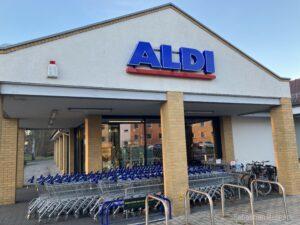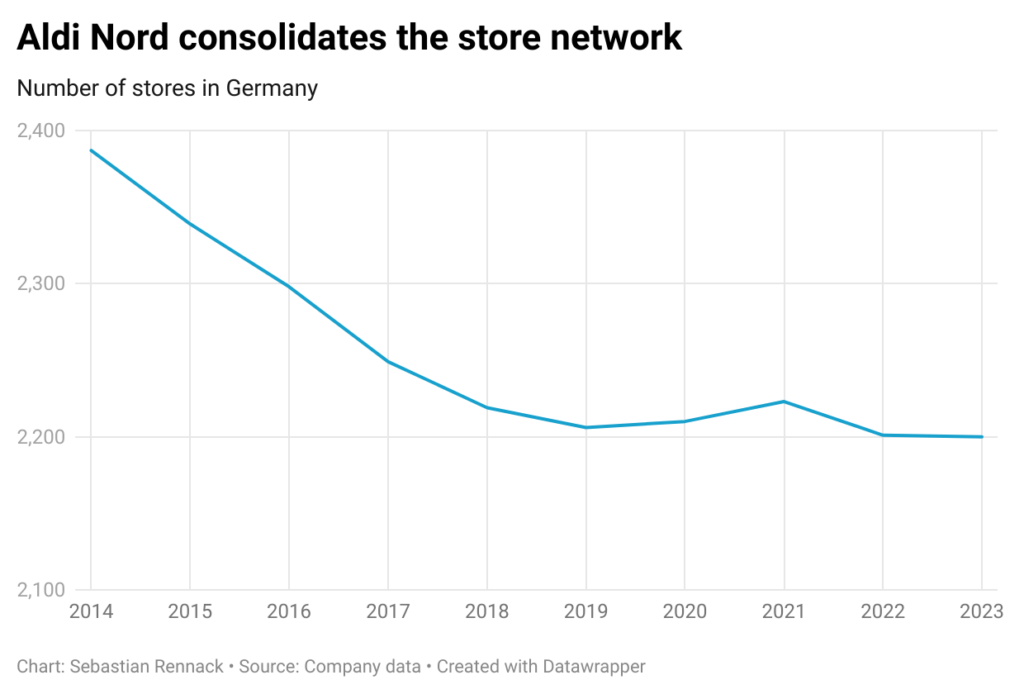Aldi Nord consolidates logistics and sales structures
After years of cost savings the discounter eyes international expansion push

Aldi Nord in Germany wants to further simplify its sales structures and optimize the supply of its stores. By the end of the year, 2 of the currently existing 22 regional Aldi companies are to be closed. The 146 stores affected, including 2000 store employees, are to be assigned to the 6 neighboring regions. After the closure of the two regional hubs, only 20 of the former 35 Aldi Nord regional entities will remain. This way Aldi wants to make its operations more cost effective. Competitor Lidl operates 22 regional companies on the territory that Aldi Nord covers. All in all Lidl manages 39 regional companies throughout Germany. Aldi Nord’s twin company Aldi Süd in the South operates 25 regions, so that both Aldis together at the turn of the year will come up to 37 regions.
According to industry sources many of the older logistics centers attached to the regional companies are no longer up to date and cannot handle the growing product ranges cost-effectively. This is because Aldi’s standard product ranges have been greatly expanded in recent years, resulting in an increased demands on logistics structures. While the standard product range at Aldi Nord in Germany according to company data in 2015 consisted of 1183 items, by 2022 this figure had risen to 1866, an increase of almost 60 percent. Additionally, already in autumn 2022 Aldi Nord had centralized the buying function for fruit & vegetables, baked goods and regional items, which earlier was managed by the regional teams.
The move is part of a package of long-term measures with which Aldi aims to improve efficiency and profitability. Aldi Nord for the first time in the company’s history in 2018 had slipped into red figures and only 2020 was able to reach the profit zone again. Over the past ten years the discounter has closed around 200 stores in Germany (see chart). According to the company, the retailer currently operates around 2,200 points of sale in the North and the East of Germany.

After a long phase of optimization the consolidation of the sales network at Aldi Nord appears to have come to an end. Last fall, the Aldi Group announced an ambitious three-year plan: By 2026, the discounter intends to expand its European store network of currently 5,300 stores to over 6,000 objects. The focus will be on the foreign subsidiaries in France, Poland and Spain. For this purpose the discounter already in September last year created a new international holding structure specifically for its international business. The foreign business accounts for around 50% of the Group’s sales of 27 billion euros in 2022. In addition, there is the US business of Trader Joe‘s, which belongs to Aldi Nord and generates an estimated turnover of 16.5 billion US dollars.
In contrast to other retailers, whose expansion is currently in many cases stalling due to high interest rates on loans, Aldi is largely independent of the external capital market. The discounter operates almost entirely without outside capital.
Related news
Pepsi® Prebiotic Cola now available nationwide in store and online
🎧 Hallgasd a cikket: Lejátszás Szünet Folytatás Leállítás Nyelv: Auto…
Read more >Related news
Nestlé to sell remaining ice-cream assets but commits to Froneri venture
🎧 Hallgasd a cikket: Lejátszás Szünet Folytatás Leállítás Nyelv: Auto…
Read more >40 secure jobs, sustainable solutions – new BURGER KING® in Csepel
🎧 Hallgasd a cikket: Lejátszás Szünet Folytatás Leállítás Nyelv: Auto…
Read more >





